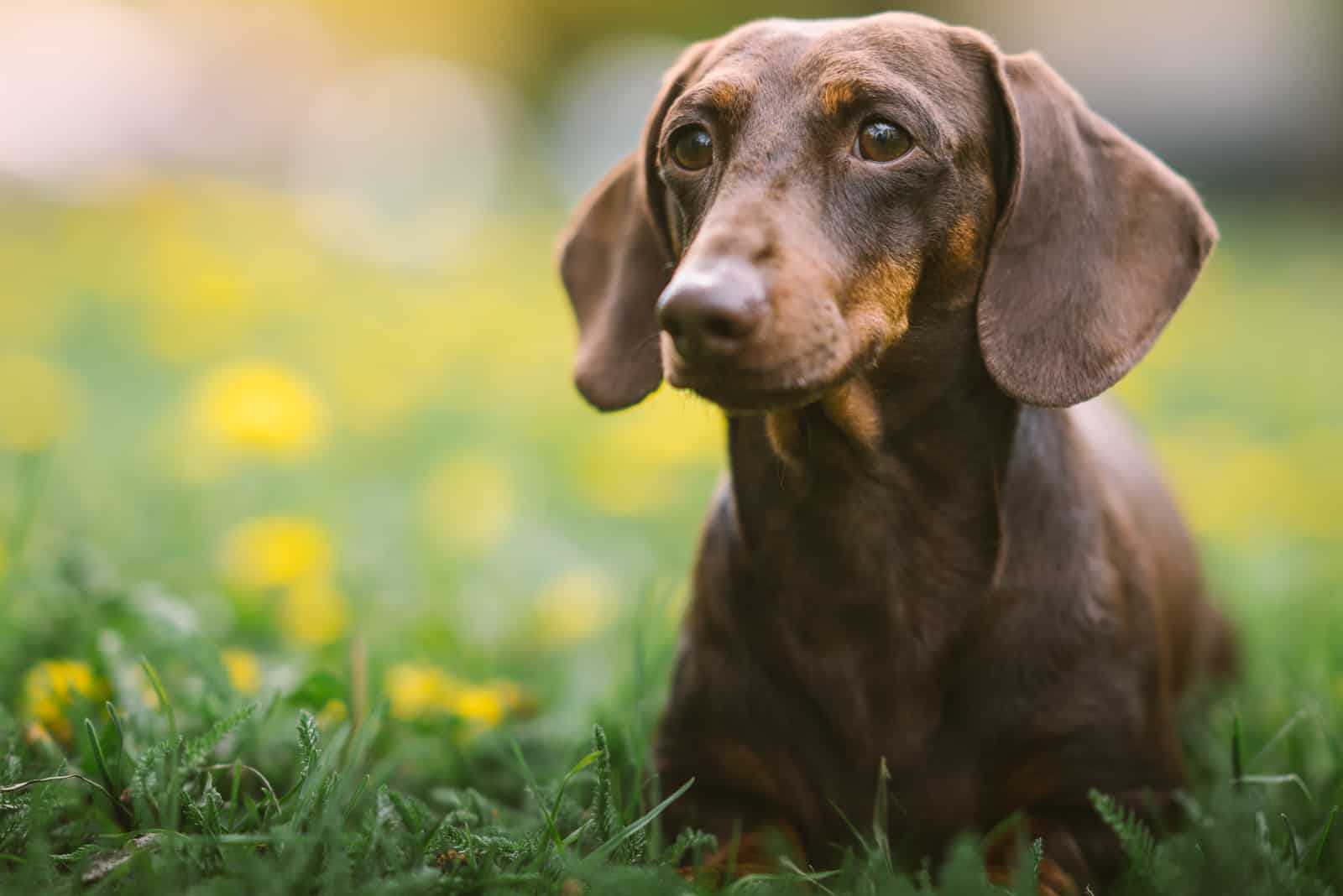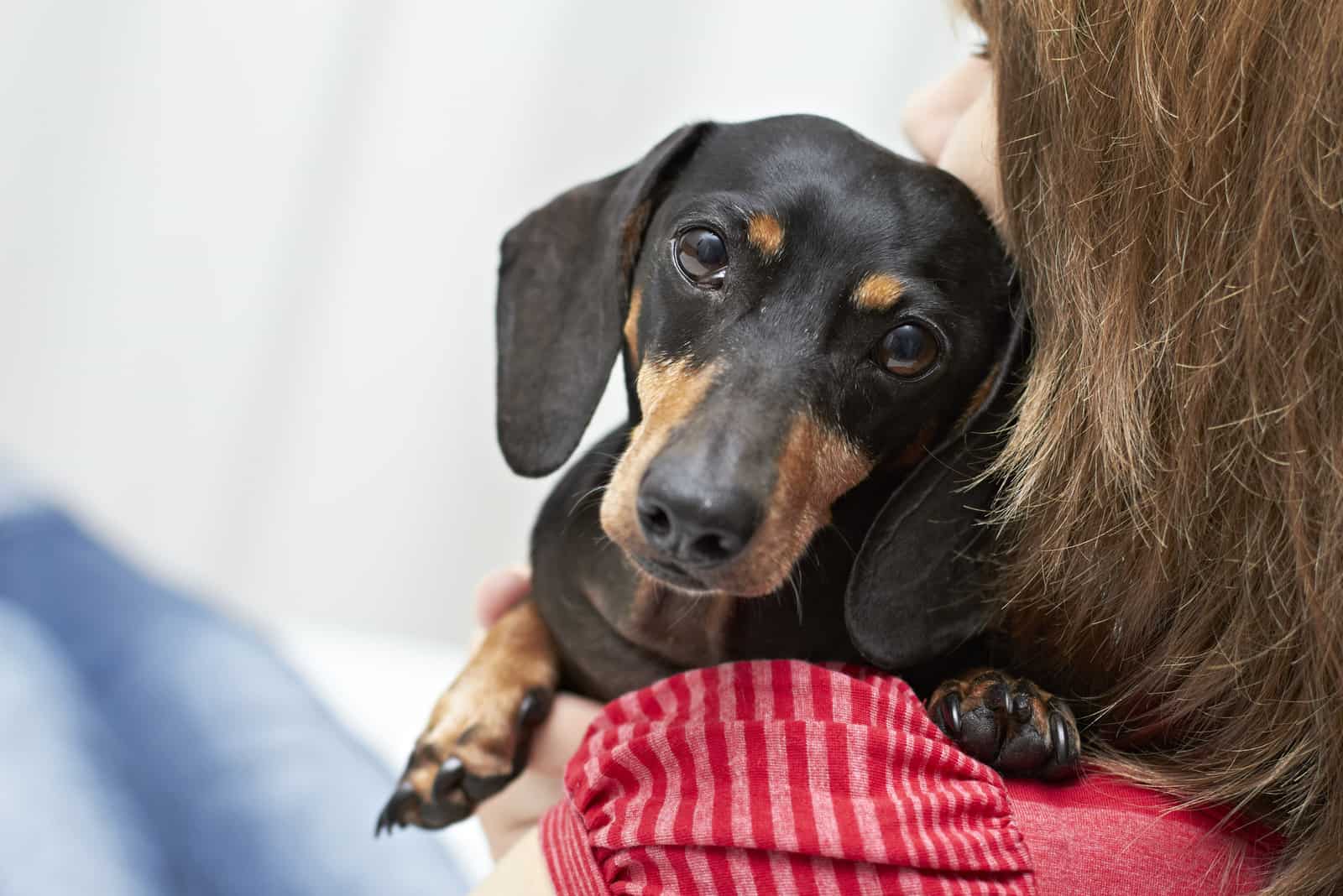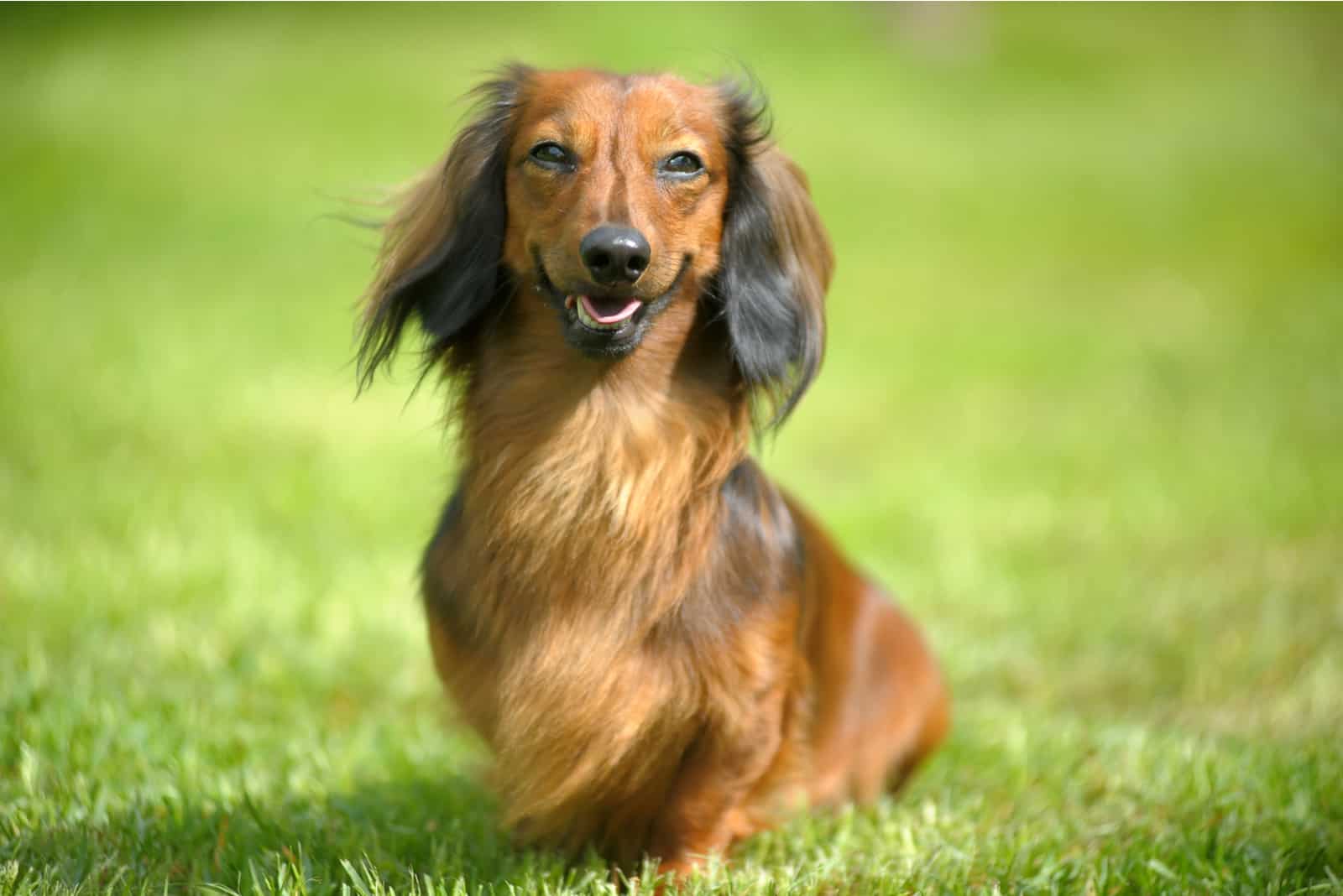In a word, no.
But there’s a good chance that you were probably hoping for a bit more than that. And this would be a short and pointless article if we abandoned it right here!
You’ll be happy to know that we’ve got a bit more to say on the subject: while the Dachshund isn’t considered a hypoallergenic breed, it’s not as cut and dried as some people would have you believe. Are you intrigued?
Then read on to discover more!
Allergy sufferers don’t have much fun when the symptoms start. These range from mild to pretty severe, so they have to be very careful what they do, where they go, and what they expose themselves to.
This makes life extremely difficult for dog lovers and their family members with allergies. They want to get a dog, but they run the risk of constantly having an allergic reaction.
So what are they to do?
Well, to begin with, they can look for hypoallergenic dog breeds. We’ll explore this term later, but in the meantime, our focus is on the Dachshund, otherwise known as the Doxie, Sausage dog, and Wiener dog, among others!
We’ll ask the question again:
Are Dachshunds Hypoallergenic?

We’ve indicated that they aren’t, but to answer this question in more detail, we have to understand what is meant by hypoallergenic.
This word has caused much misunderstanding and many arguments, so let’s try to make it clear and simple:
Anything hypoallergenic is less likely to cause an allergic reaction.
Note those two words in the middle of the sentence: less likely. Whether we’re talking about dogs, cosmetics, jewelry, food, or anything else, something that is hypoallergenic is designed to reduce any possible allergic reaction. The risk isn’t eliminated, merely reduced.
It doesn’t mean ‘allergy-free,’ whatever anyone claims. Now, you wouldn’t think that this word would cause so much anger and confusion, but people still get steamed up over it. Many of them shout, there’s no such thing as a hypoallergenic dog!
In fact, there is – if you understand the term and use it correctly.
Some dog breeders state that their dogs are hypoallergenic, which seems to push all the wrong buttons with certain people. In all honesty, these breeders have done nothing wrong (provided their dogs do have a reduced risk of triggering allergic reactions).
However, where they do cross the line is when they say that their dogs are 100% hypoallergenic, suggesting that this quality can be measured accurately. It also gives the misleading impression that their dogs are allergy-free.
On the whole, it’s best to avoid breeders who use the terms allergy-free and 100% hypoallergenic, as they clearly don’t understand what the word means, or they are behaving in an underhand manner. Hopefully, this has cleared up any misunderstandings.
So, back to our Doxie dog and our main question, are Dachshunds hypoallergenic? Can you get Dachshunds that have a reduced risk of triggering an allergic reaction?
Without wishing to raise your hopes too high, there are three types of Dachshund, and it looks as if some are better than others in terms of allergies. However, we need to dig deeper to find out more.
Why Am I Allergic To My Dachshund?

Let’s take a look at what’s going on when those pesky allergies make your life a misery.
The human immune system is a wonder of nature, and it works continually to keep us safe from the billions of bugs, bacteria, and nasty things trying to kill us or make us sick.
Honestly, if you knew just how many times your immune system has saved your skin every single day, you’d treat it with a lot more respect!
Even so, it isn’t always perfect and sometimes goes too far. When particular proteins enter the body, usually via the eyes, nose, and mouth, our immune system checks whether they are harmful or not. And it sometimes gets it very wrong.
In the case of dog allergies, your immune system finds proteins that are present in your dog’s dander (dry skin flakes, a bit like dandruff), urine, and saliva that have made their way inside your nose, mouth, or eyes.
No, it’s not a pleasant thought, but it happens all the time! And when it does, your immune system sometimes misidentifies these allergens as harmful substances. It then goes into overdrive, telling your body to produce more histamine. This hormone signals the mucus glands to increase production, as
the mucus lining protects against harmful invading particles. Histamine also causes tiny blood vessels to swell, resulting in inflammation, swelling, and puffy, itchy eyes. You’ll sneeze violently to rid your nose of ‘harmful’ contaminants. Skin rashes are a common reaction, too.
All because your immune system overreacted!
Mild allergies are irritating but can be managed using antihistamines. Severe allergies can be a serious problem, as your body can go into anaphylactic shock. Thankfully, such extreme reactions are exceedingly rare in relation to pet allergies.
However, evidence suggests that people can suddenly develop an allergic reaction to their dog, especially if there is a history of asthma in their family. The immune system puts up with the allergens for so long, but one day it may decide that they are harmful, and then the ‘fun’ begins!
Finally, it’s worth mentioning that countless dog owners believe that their dog’s fur is the culprit. As we said above, the proteins in the pet dander and saliva (and urine, to an extent) cause a bad reaction, not the fur itself. Even a hairless dog can cause pet allergies!
So, when breeders sell low-shedding dogs as hypoallergenic, it may not be the case. While it might help, it’s the amount of dander they produce that causes the problem, not the amount of hair they shed.
Are Miniature Dachshunds Hypoallergenic?

It seems that wherever you look, the word is that most sources have a negative answer to the question, are Dachshunds hypoallergenic?
This is partly due to the American Kennel Club (AKC), as they list the Doxie dog as a non-hypoallergenic breed, and this stance is widely accepted.
So, the standard Dachshund isn’t considered a great choice if you have allergies, but what about the mini-version?
Sadly, it’s the same story. These small dogs (only measuring between 5 and 6 inches at the shoulder) are exactly the same as the bigger dogs, just on a miniature scale. Some mini-Dachshunds aren’t purebred, as they’re crossed with another small breed of dog, like the Chihuahua.
The trouble is, mini-Doxie coats are usually identical to the standard-sized, smooth-haired dog and they’ll produce dander. And as your dog’s saliva carries allergens, there’s a good chance that you’ll get this on your hands and face at some point.
However, looking on the bright side, as these dogs are so small, they won’t produce as much dander as a much bigger dog. They’re also moderate shedders, meaning they won’t drop dog hair all over. So, compared with other breeds, like the Labrador Retriever or German Shepherd, they are better for allergy sufferers.
Are Shorthaired Dachshunds Hypoallergenic?

The standard shorthaired Sausage dog has a smooth coat that’s easy to look after. Even so, it tends to shed more than the longhaired or wirehaired dog.
The short hairs have nothing to cling to and fall off the coat when they die. As they are so short and lightweight, they will be caught up in currents of air that move around your home. Due to this, there’s an increased risk that hairs (carrying dander and dried saliva) will float up and around your home.
These hairs will eventually land on you or on surfaces you touch, so the allergens have a better chance of entering your system.
Are Longhaired Dachshunds Hypoallergenic?

Curiously, the longhaired version is possibly better than the shorthaired dog!
This is because the longer hairs from their thick undercoat tend to stick together, making them heavier. These clumps of hair gather on your furniture as the dog rubs against it, making it easier to collect.
Therefore, the risk of exposure to dander is reduced.
Even so, this works better if you brush your dog at least a couple of times a week. It’s also a great idea to thoroughly vacuum your furniture to remove any loose hair.
Are Wirehaired Dachshunds Hypoallergenic?
Like the longhaired Doxie, the wirehaired version tends to shed less than the shorthaired dog.
Their coat isn’t actually that long; the name wire hair refers to their long mustache, beard, and bushy eyebrows! The coat has a coarse, wiry feel, hence the name.
The wirehaired dog sheds the least out of the three coat types, possibly making it the best choice for allergy sufferers.
This coat requires grooming several times a week to keep it under control. You must also strip (remove the outer guard hairs by hand) the coat twice a year. Coat stripping can be tricky, so you should consider using a professional groom.
Tips For Coping With Dog Allergies

If you have a mild allergy, you could still own a dog, provided you take a few precautions. However, please note that this is general information only and in no way constitutes medical advice. You alone know how mild or severe your allergy is, and you need to speak to your GP, allergist, or a medical professional for proper allergy advice.
One way of reducing allergies is to get a hypoallergenic dog. And there’s a wide variety to choose from! There’s the Poodle, Portuguese Water Dog, Chinese Crested, Irish Water Spaniel, Mini Schnauzer, Bichon Frise, Soft-Coated Wheaten Terrier, Maltese, or any mixed breeds that include one of these dogs.
However, you’re probably reading this because you want to get a Dachshund puppy, not one of those other breeds!
So, for all you erstwhile Dachshund owners with concerns about allergies, here are a few tips:
• Invest in a decent vacuum cleaner designed to tackle pet hair, and be sure to use it regularly – at least twice a week. These machines have HEPA filters that stop allergens from floating about your home.
• Use air purifiers to keep the air clear and free from dust and dander.
• Brush your dog regularly, and do this outdoors if possible to minimize the risk of hair floating about inside the home.
• Bathe your dog regularly using breed-specific shampoo and conditioner. These will keep their skin moisturized and less likely to produce dander.
• Feed your pooch good-quality dog food that includes omega-3 and six fatty acids. A healthy, nutritious diet is essential for your dog’s skin and coat. Feeding your dog table scraps dulls the coat and increases dander (as well as causing other health problems!).
• Ensure that you have good ventilation in your home. Keep windows open for about an hour each day to allow air to move freely.
• Wash out your dog’s bedding once a week to get rid of loose hairs and dander.
• If practical, replace carpets and rugs with hard flooring that’s easier to clean and won’t trap dog hair.
Finally, it’s believed by some experts that exposing children to dogs at an early age lessens the chance of allergies later in life.
Hypoallergenic Dachshund Mix

Photo from: @dachshundlominua
As mentioned above, some breeders produce mixed breeds that are considered hypoallergenic.
Although you have your heart set on a cute little Sausage Dog, it’s always worth considering other alternatives, particularly if allergies are a real concern.
A quick search online brings up a mind-boggling collection of Dachshund mixes, from the Dalmachshund to the Chiweenie (a cross between the Dachshund and the Dalmatian, and the Dachshund and Chihuahua, respectively).
However, for those searching for a hypoallergenic dog, you might want to consider the Dachshund Poodle mix, also known as the Doxiepoo.
Poodles are famous for their hypoallergenic coat. Unlike the double coat that many other breeds have, the Poodle has a dense single coat that doesn’t shed much. Loose hairs get trapped in the coat, preventing them from falling around your home. Due to this, there’s less chance of exposure to dander.
Doxiepoos inherit the curly Poodle coat (and they’re pretty cute, too!), making them a good choice if you have allergies.
You also might want to consider the Shiweenie (don’t blame us, we don’t invent these names!), a mix of the Dachshund dog and Shih Tzu.
In the end, it’s your choice, but neither of these is the Weiner dog.
Are Dachshunds Hypoallergenic? The Final Word
We’ve learned enough by now to answer the question, are Dachshunds hypoallergenic?
These funny little dogs are not generally considered hypoallergenic, but some are better for allergy sufferers than others. We also know that there are ways to manage your condition.
So, it’s not all bad news!
Here’s a quick summary of the facts:
• Dachshunds are small, so they produce less dander than big dogs.
• Wirehaired Doxies are less likely to leave hair around your home, so they are possibly the best choice of the three Dachshund types for people with allergies.
• Longhaired Weiner Dogs are similar to the wirehaired version and could be better for allergy sufferers than the smooth-coat types.
• There are several ways of reducing pet dander exposure in your home, making life with your furry friend much happier!
Here’s the bottom line: only you know how bad your allergy can be (or that of your family members who suffer from allergies). There’s also a possibility that anyone can develop a pet allergy.
It’s up to you if you want to take the risk, but with sensible precautions, it is entirely possible for someone who suffers from mild allergy symptoms to own a Dachsund and not be constantly suffering as a result.
We’ve added some extra, common sense advice to help you reduce the chances of exposure to allergens. Using this, you should be able to enjoy spending time with your furry friend without all the sneezing!
Read Next: Top 10 Dachshund Breeders In North Carolina You Will Love
